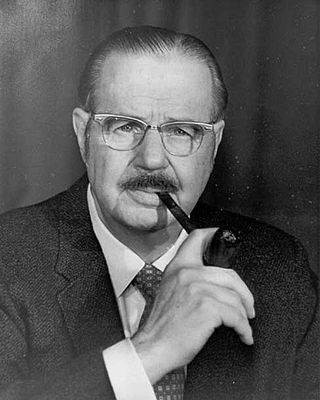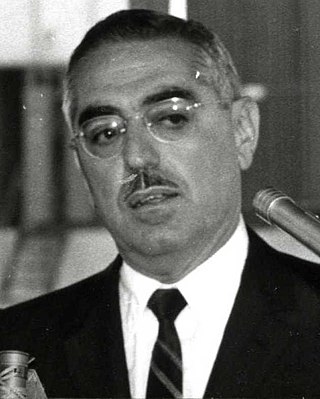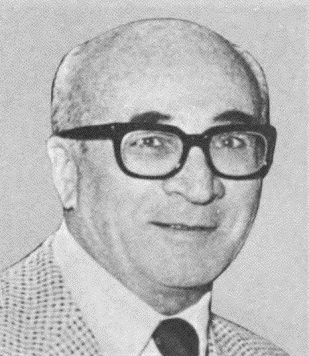The Kennedy family is an American political family that has long been prominent in American politics, public service, entertainment, and business. In 1884, 35 years after the family's arrival from County Wexford, Ireland, Patrick Joseph "P. J." Kennedy became the first Kennedy elected to public office, serving in the Massachusetts state legislature until 1895. At least one Kennedy family member served in federal elective office from 1947, when P. J. Kennedy's grandson John F. Kennedy became a member of Congress from Massachusetts, until 2011, when Patrick J. Kennedy II retired as a member of the U.S. House of Representatives from Rhode Island.

Ralph Webster Yarborough was an American politician and lawyer. He was a Texas Democratic politician who served in the United States Senate from 1957 to 1971 and was a leader of the progressive wing of his party. Along with Senate Majority Leader Lyndon B. Johnson and Speaker of the House Sam Rayburn, but unlike most Southern congressmen, Yarborough refused to support the 1956 Southern Manifesto, which called for resistance to the racial integration of schools and other public places. Yarborough voted in favor of the Civil Rights Acts of 1957, 1960, 1964, and 1968, as well as the 24th Amendment to the U.S. Constitution, the Voting Rights Act of 1965, and the confirmation of Thurgood Marshall to the U.S. Supreme Court. Yarborough was the only senator from a state that was part of the Confederacy to vote for all five bills.

Albert Arnold Gore Sr. was an American politician who served as a United States Senator from Tennessee from 1953 to 1971. A member of the Democratic Party, he previously served as a U.S. Representative from the state's 4th congressional district from 1939 to 1953. He was the father of Al Gore, who served as the 45th vice president of the United States from 1993 until 2001, and held Tennessee's other U.S. Senate seat from 1985 to 1993. A native of Granville, Tennessee, Gore graduated from Middle Tennessee State Teachers College and taught school. From 1932 to 1936 he was superintendent of schools for Smith County. He attended the Nashville Y.M.C.A. Night Law School, now the Nashville School of Law, from which he graduated in 1936.

Hugh Doggett Scott Jr. was an American politician. A member of the Republican Party, he represented Pennsylvania in the U.S. House of Representatives from 1941 to 1945 and from 1947 to 1959 and in the U.S. Senate, from 1959 to 1977. He served as Senate Minority Leader from 1969 to 1977.

Robert Hutchinson Finch was a Republican politician from La Canada Flintridge, California. In 1967, he served as the 38th Lieutenant Governor of California. Following Richard Nixon's presidential campaign in 1968, he was appointed Secretary of Health, Education, and Welfare in 1969. He was the Counselor to the President from 1970 until 1972. During the 1976 California United States Senate election, he lost in the Republican primary to S.I. Hayakawa.

The 1970 United States Senate elections was an election for the United States Senate. It took place on November 3, with the 33 seats of Class 1 contested in regular elections. Special elections were also held to fill vacancies. These races occurred in the middle of Richard Nixon's first term as president. The Democrats lost a net of three seats, while the Republicans and the Conservative Party of New York picked up one net seat each, and former Democrat Harry F. Byrd Jr. was re-elected as an independent.

The 1966 United States Senate elections were elections on November 8, 1966, for the United States Senate which occurred midway through the second term of President Lyndon B. Johnson. The 33 seats of Class 2 were contested in regular elections. Special elections were also held to fill vacancies. With divisions in the Democratic base over the Vietnam War, and with the traditional mid-term advantage of the party not holding the presidency, the Republicans took three Democratic seats, thereby breaking Democrats' 2/3rds supermajority. Despite Republican gains, the balance remained overwhelmingly in favor of the Democrats, who retained a 64–36 majority. Democrats were further reduced to 63–37, following the death of Robert F. Kennedy in June 1968.

The 1964 United States Senate elections were held on November 3. The 33 seats of Class 1 were contested in regular elections. Special elections were also held to fill vacancies. They coincided with the election of President Lyndon B. Johnson by an overwhelming majority, to a full term. His Democratic Party picked up a net two seats from the Republicans. As of 2023, this was the last time either party has had a two-thirds majority in the Senate, which allowed the Senate Democrats to override a veto, propose constitutional amendments, or convict and expel certain officials without any votes from Senate Republicans. However, internal divisions would have prevented the Democrats from having done so. The Senate election cycle coincided with Democratic gains in the House in the same year.
The Senate was the upper house of the Parliament of South Africa between 1910 and its abolition from 1 January 1981, and between 1994 and 1997.

John Orlando Pastore was an American lawyer and politician. A member of the Democratic Party, he served as a United States Senator from Rhode Island from 1950 to 1976 and as the 61st governor of Rhode Island from 1945 to 1950. He was the first Italian American elected to the Senate.

Teno Domenico Roncalio, born Celeste Domenico Roncaglio, was an American politician and writer who served in the United States House of Representatives. To date, he is the last Democrat to have represented Wyoming in the House of Representatives.

Billie Sunday Farnum was a politician from the U.S. state of Michigan. He served one term in the U.S. House of Representatives from 1965 to 1967.

The Kingdom of Libya, known as the United Kingdom of Libya from 1951 to 1963, was a constitutional monarchy in North Africa that came into existence upon independence on 24 December 1951 and lasted until a bloodless coup d'état on 1 September 1969. The coup, led by Muammar Gaddafi, overthrew King Idris and established the Libyan Arab Republic.
This is a list of members of the Australian Senate from 1968 to 1971. Half of its members were elected at the 5 December 1964 half Senate election and had terms due to finish on 30 June 1971; the other half were elected at 25 November 1967 half Senate election and had terms due to finish on 30 June 1974. The process for filling casual vacancies was complex. While senators were elected for a six-year term, people appointed to a casual vacancy only held office until the earlier of the next election for the House of Representatives or the Senate.
This is a list of members of the Australian Senate from 1965 to 1968. Half of its members were elected at the 9 December 1961 election and had terms starting on 1 July 1962 and finishing on 30 June 1968; the other half were elected at the 5 December 1964 half Senate election and had terms starting on 1 July 1965 and finishing on 30 June 1971. The process for filling casual vacancies was complex. While senators were elected for a six-year term, people appointed to a casual vacancy only held office until the earlier of the next election for the House of Representatives or the Senate.
This is a list of members of the Australian Senate from 1962 to 1965. Half of its members were elected at the 22 November 1958 election and had terms starting on 1 July 1959 and finishing on 30 June 1965; the other half were elected at the 9 December 1961 election and had terms starting on 1 July 1962 and finishing on 30 June 1968. The process for filling casual vacancies was complex. While senators were elected for a six-year term, people appointed to a casual vacancy only held office until the earlier of the next election for the House of Representatives or the Senate.

Sir Razik Fareed, OBE, JP, UM, also known as A. R. A. Razik, was a Ceylonese landed proprietor, politician and philanthropist. He was the former Cabinet Minister of Trade, Senator, member of parliament and the state council. He had also served as Ceylon's High Commissioner to Pakistan.

General elections were held in Libya on 17 January 1960 to elect the members of the House of Representatives, the lower house of Parliament.
Ibrahim Adaham Abdul Cader, known as I. A. Cader was a Sri Lankan lawyer and member of the Parliament of Sri Lanka.
The Ministry of Finance of Libya is the finance ministry responsible for public finances of Libya.












